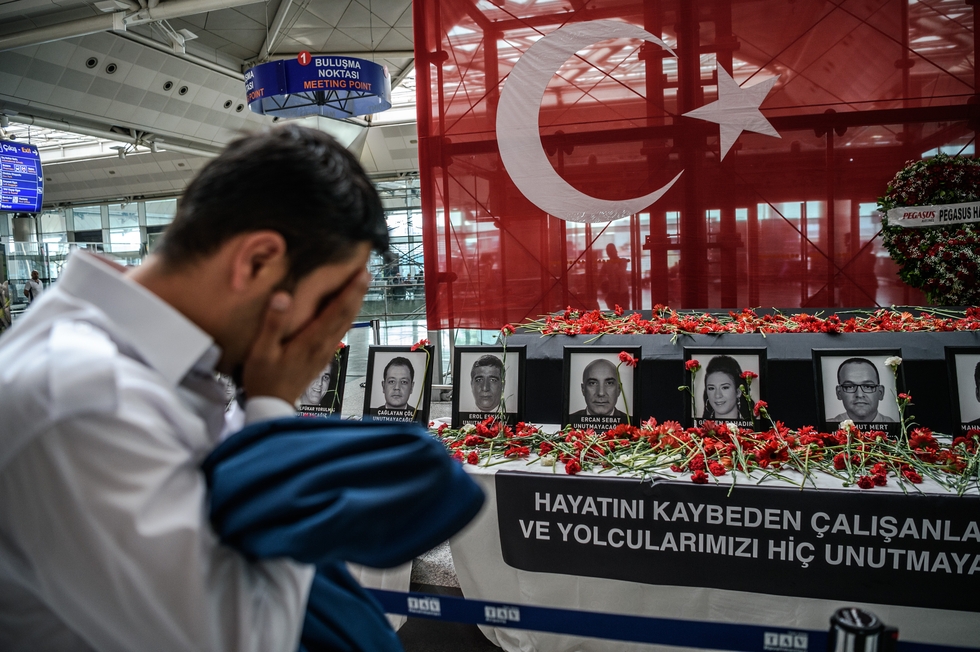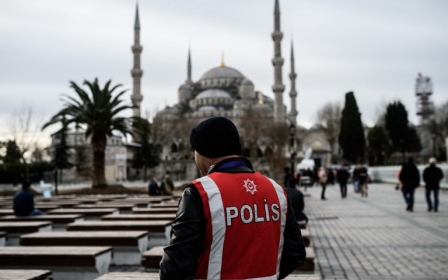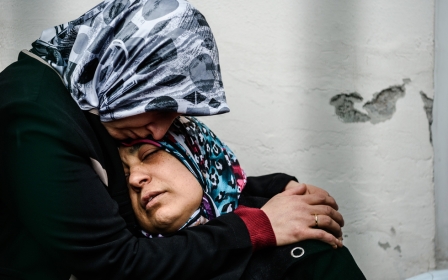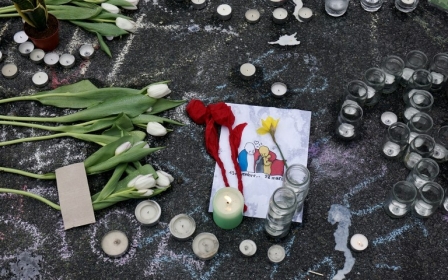What's the motive behind the latest terror attack against Turkey?

The terrorist attack at the third busiest airport in Europe was the deadliest suicide attack that Turkey has experienced in recent months. The country has been targeted as a country that is part of the US-led anti-Islamic State (IS) coalition and that has difficulty curbing the fallout of the civil war in neighbouring Syria.
Following the attack that left more than 40 dead, the first question coming to mind is to whom the IS terrorist organisation is sending a message by closing Turkey’s most important gateway to the world with such an act of sabotage? This question must certainly be answered in order to properly interpret the Istanbul blast. The whole world’s security bureaucracy must acknowledge that major airports have become a target for jihadist groups since al-Qaeda’s 9/11 attacks.
Turkish Prime Minister Binali Yildirim, who has newly taken office, delivered a speech during the Justice and Development Party’s (AK Party) parliamentary group meeting a couple of hours before the explosion, saying that Turkish-Israeli relations, which had been strained for the past six years, would return to normal. He also referred to President Recep Tayyip Erdogan’s recent letter to Russian President Vladimir Putin expressing regret for the downing of a Russian fighter jet on the Syria border in November.
Yildirim expressed his hopes that the Turkey-Russia rapprochement would strengthen Turkish tourism, given that the number of tourists visiting Turkey in May 2016 dropped by 34.7 percent compared to the same month last year – which was the highest decline in Turkish tourism since the 1990s. As Turkey hoped to reap the fruits of the tourism diplomacy that it practices with many challenges, the third-largest international airport in Europe, in other words “Turkey’s gateway,” became a target for the IS terrorist organisation on Tuesday evening.
Turkey is fighting IS by expanding its air-supported cooperation along with the US-led coalition. Turkey supports insurgent groups that fight IS in Syria and works more efficiently than before to stop IS groups that want to enter Syria. It has brought relations with Israel back on track and apologised to Russia for the Russian fighter jet which was downed in November. Wishing to return to warm diplomatic relations, Turkey is reconfiguring IS’s relations with big enemies like Russia. Therefore, IS’s attitude toward Turkey has changed and it strives to demonstrate through its deadly attacks that Turkey is also its enemy. It seems IS will make Turkey a central target for its attacks alongside the EU countries it also targets.
Coincidence with PKK terror attacks
Since last summer, attacks from IS and the separatist armed Kurdistan Workers’ Party (PKK) are continuously rising in Turkey. Although the the two groups are enemies in Syrian territory, IS and the PKK conduct attacks one after the other, seeming to support each other in Turkey. This surprises the man in the street as much as terrorism specialists in the country.
Tuesday’s blast was the fifth terrorist attack that Istanbul has experienced since the beginning of the year and the 17th attack that Turkey witnessed over the past two months. A total of seven police officers and four civilians lost their lives as a result of the explosion of a bomb-laden car in Istanbul's Vezneciler district near Istanbul University and Grand Bazaar just three weeks ago. The explosives were remotely detonated as a police bus passed through the district on 7 July The Kurdistan Freedom Falcons (TAK), which is a splinter group from the PKK, claimed responsibility for the attack. The same terrorist organisation also carried out two attacks with bomb-laden vehicles in Ankara in February and March.
Meanwhile, IS jihadists have conducted two suicide attacks that killed a total of 16 people, including 12 tourists, in Istanbul since the beginning of the year. The organisation, which is inclined to use suicide attacks, conducts attacks without discrimination toward Turkey’s geographical and political features. Yildirim pointed to IS as the perpetrator of the attack within three hours of the incident.
The Istanbul attack has once again revealed the main objectives of terrorism. International air transport, airports and flights are obviously the targets of terrorism.
The jihadists of the same terrorist organisation attacked Paris on 13 November 2015 as well as Brussel’s Zaventem Airport and Molembeek metro station on 22 March, killing 32 people in two spots. Moreover, EgyptAir’s plane that plunged into the Mediterranean while flying from Paris to Cairo during the flight number 804 on 19 May still remains a mystery. A total of 66 people died as a result of the plane crash. The international security bureaucracy must address the targets that IS now focuses on. Obviously, it is essential to create a new security perspective on air transport.
Atatürk Airport is a symbolic target. It is highly important for the Turkish economy which is going through hard times because of a substantial decline in the number of tourists visiting the country. It is named after the founder of the Republic of Turkey and is a symbol of Turkey’s economic growth.
Existing strict security measures at Turkish airports
Unlike other airports in Europe, entry controls are exercised before passengers enter the terminal at Turkish airports. Suitcases are scanned before they reach the gates and passengers are obliged to pass through metal detectors. It is known that security staff are not lax about their task because of the great terror threat in Turkey. As such, assertions indicating a security lapse are not true at all.
On the other hand, it is a fact that suicide bombers did not conduct the attack spontaneously. Turkey, which has been targeted by terrorism for many years, seems more sheltered than EU airports with the security measures it takes at airports. Given that terrorists entered the terminal from the exit gate – a point where the security measures are at a lower level just like at all airports – I think they arrived the airport several times before the attack to observe it and then they chose the gate where they would detonate themselves.
The fact that the attackers were foreign nationals is another point showing that the organisation worked very carefully on the attack. They were three foreigners who did not speak in Turkish or English when they were communicating with each other. This is the most rational way of avoiding the eavesdropping of the domestic intelligence agencies. The cell phones found on the three suicide bombers after the blast revealed that there was a network among them and domestic intelligence failed to eavesdrop them. The deployment of foreign terrorists is a way of weakening domestic intelligence as seen in this incident.
As I stated above, suicide bombers are quite likely to have entered the airport at least three times before the attack and determined a spot to detonate themselves. Now, the police are examining footage from 361 security cameras at the airport. However, the major issue of concern is how these three foreign nationals were able to obtain bombs and arms that they used in the attack; how long they had been in Turkey before the attack and who their collaborators are inside Turkey.
Another question that needs an answer is how they could have entered the airport, how did the police not realise they were terrorists trying to enter in coats despite the summer heat, or did they have collaborators inside the airport?
Intense anti-IS operations over the past month
In fact, Turkey has been launching operations against all IS targets along its border at two-day intervals over the past month. However, it eased its military rules of engagement to some extent over the past 20 days to ensure that NATO aircrafts could move around freely on the Syria border. It was expected that IS would initiate new acts and the US’s warning to its citizens in Turkey about security appeared to point the way to imminent attacks.
With the Syrian civil war, the Turkey-Syria border has become a laboratory for terrorist organisations. Groups like the PKK, IS, Revolutionary People's Liberation Party Front (DHKP-C) and Marxist-Leninist Communist Party (MLKP), which have improved their war capabilities in Syria, have been posing a serious threat for the past year.
Turkey had been successfully fighting the PKK in the mountains since 1984. However, with the start of the Syria crisis, terrorism’s model of activism has changed, so much so that the PKK, which was active in the mountains previously, went down to the cities where it dug more than 1,200 trenches and placed bombs in them in eastern and southeastern Turkey. It attracted the attention of Turkish security forces to the region for six months.
IS was a new threat for Turkey. However, IS acts over the past year show that it will continue to bother us for a while longer. In short, there are efforts to occupy Turkey’s military and security mind by testing it with terror on borders, big cities and eastern and southeastern provinces. Some might be saying, “We are planning new things here, so you should focus on your domestic security.”
- Cetiner Cetin is the Middle East Desk and International Media Manager at the Turkish Prime Ministry's Public Diplomacy office. He writes political analyses in the Turkish Daily Yeni Safak. He had previously worked with the news channels NTV and TRT in Iraq. You can follow him on Twitter @cetiner_cetin
The views expressed in this article belong to the author and do not necessarily reflect the editorial policy of Middle East Eye.
Photo: An airport employee mourns for his colleagues as he looks at the pictures of killed airport employees at Ataturk airport international terminal in Istanbul on 30 June, 2016 two days after the triple suicide bombing and gun attack occurred at the airport (AFP).
This article is available in French on Middle East Eye French edition.
New MEE newsletter: Jerusalem Dispatch
Sign up to get the latest insights and analysis on Israel-Palestine, alongside Turkey Unpacked and other MEE newsletters
Middle East Eye delivers independent and unrivalled coverage and analysis of the Middle East, North Africa and beyond. To learn more about republishing this content and the associated fees, please fill out this form. More about MEE can be found here.





